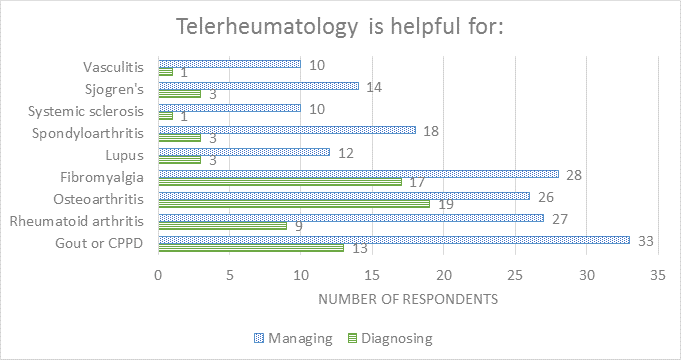Session Information
Session Type: ACR/ARHP Combined Abstract Session
Session Time: 9:00AM-11:00AM
Background/Purpose: Technological advancements and a need to improve access to care due to projected workforce shortages have led to a surge in telehealth use over the last 20 years. Clinical video telehealth application to rheumatology (i.e. telerheumatology) has received limited attention, particularly regarding provider perceptions of clinical usefulness. Our objective was to assess rheumatologists’ perceptions of and experiences with telehealth and telerheumatology within the Veterans Health Administration (VA), the largest integrated health care system in the U.S.
Methods: A 38-question survey, modeled after a telehealth providers’ satisfaction survey (Becevic et al, 2015), was developed through an iterative process by two VA rheumatologists with expertise in telehealth and a social scientist experienced in survey development. The survey assessed VA provider satisfaction with training and information technology support, as well as barriers to using telehealth systems. The survey additionally evaluated perceptions of clinical video telehealth impact on care and appropriate clinical contexts for telehealth visits. VA REDCap was utilized for survey design and online dissemination to 224 VA rheumatologists through the VA Rheumatology Consortium (VARC). Survey responses were analyzed via descriptive statistics.
Results: Forty-five anonymous responses (20% response rate) were collected. Nearly half of the sample identified as female (47%), 33% were between 45-54 years old, and 71% reported working at an academic center. Physicians comprised 96% all respondents. Only 16 providers reported using clinical video telehealth services (36%) and of those, 13 (29%) had practiced telerheumatology. More than half of all respondents agreed that telerheumatology is vital to increasing access to care (59%), and 40% felt it is vital to increasing quality of care in the VA. The majority of providers felt that the greatest barrier to telerheumatology is the inability to perform a physical exam (97%). Respondents indicated that telerheumatology was more helpful for ongoing management of most rheumatic conditions rather than initial evaluation that included establishing a diagnosis (see graph).
Conclusion: A majority of responding VA rheumatologists believe that telerheumatology is vital to increasing access to care in the VA; however, providers feel the suitability of telerheumatology is dependent on the phase of care. Most respondents have never provided telerheumatology care. As remote care technologies are increasingly adopted, continued attention to provider experience and readiness will need to be addressed in order to maintain high-quality, provider- and patient-centric care systems.
To cite this abstract in AMA style:
Matsumoto RA, England BR, Mastarone G, Ganzini L, Richards JS, Chang E, Wood PR, Barton J. Provider Perceptions of Telerheumatology within the Veterans Health Administration: A National Survey Study [abstract]. Arthritis Rheumatol. 2018; 70 (suppl 9). https://acrabstracts.org/abstract/provider-perceptions-of-telerheumatology-within-the-veterans-health-administration-a-national-survey-study/. Accessed .« Back to 2018 ACR/ARHP Annual Meeting
ACR Meeting Abstracts - https://acrabstracts.org/abstract/provider-perceptions-of-telerheumatology-within-the-veterans-health-administration-a-national-survey-study/

